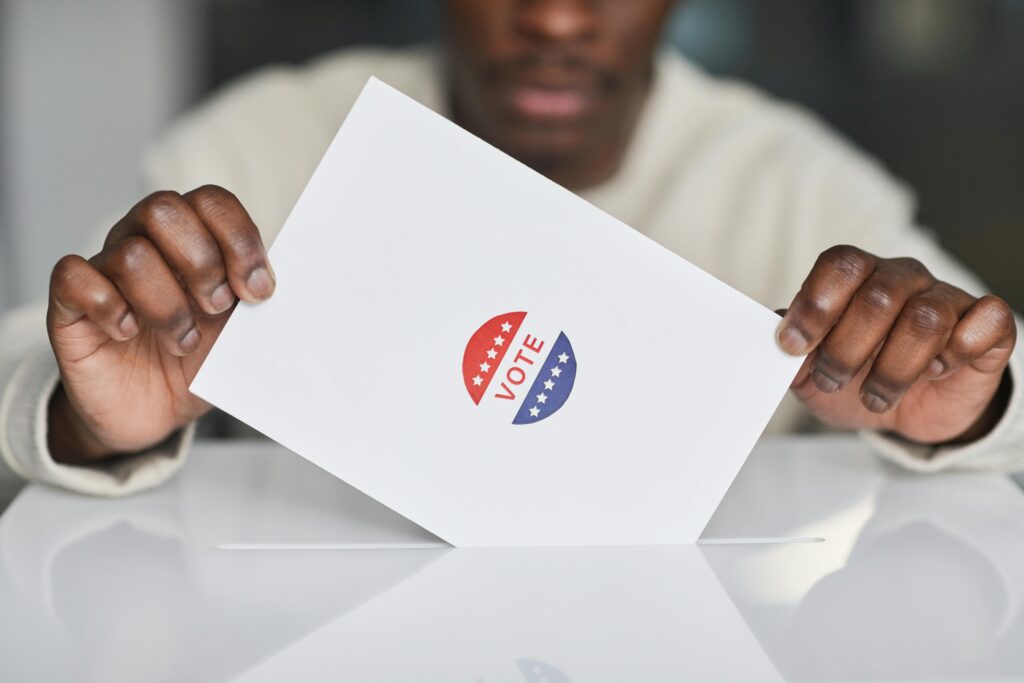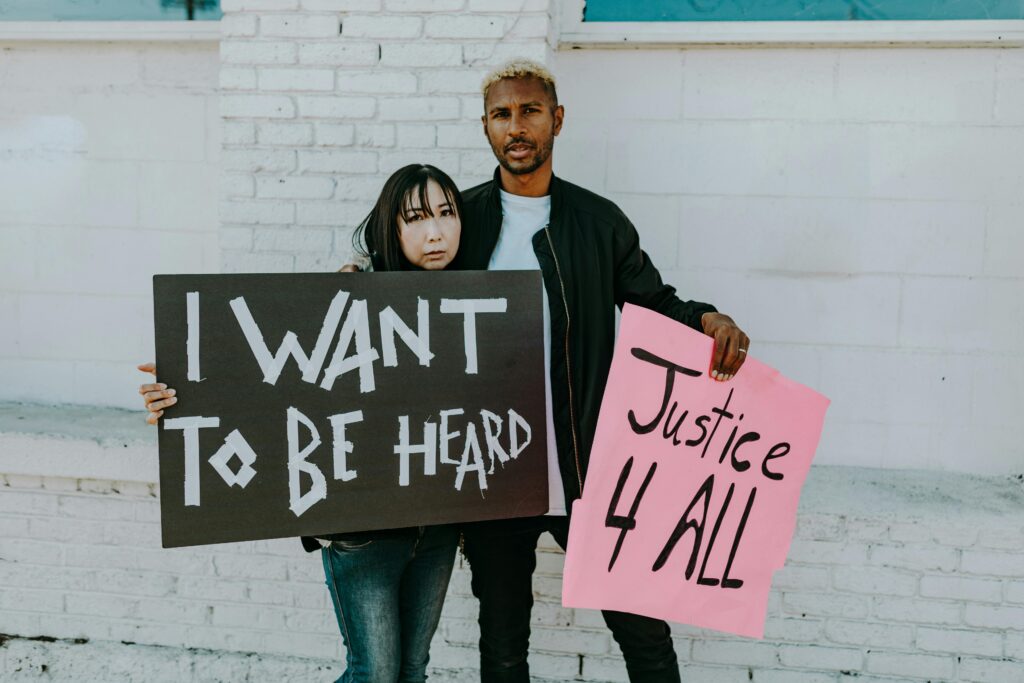After six months of long-distance and FaceTime marathons, his job is finally bringing him to your city. You’re thrilled, but nervous too. Over cups of coffee, you laugh and catch up, sliding into the familiar rhythm. It feels effortless, as always.
And then, politics comes up. Because of course, it’s January.
He starts: “I just think people focus too much on the wrong issues.” You smile tightly. “What do you mean by that?”
He’s calm, thoughtful, careful with his words—you love that about him. But the more he explains, the more uneasy you become. His views aren’t bad, exactly. Just different. Different enough to make you wonder if he’d been skirting around something bigger all this time.
Does it really matter? You both want adventure, family and to build something that lasts. He remembers the little things—like how you hate cilantro but love pistachio ice cream. And the sex? Amazing. But now, this.
You aren’t sure if you can see past it, but you want to try. “Maybe this is just one of those things,” you say slowly, “where we agree to disagree?” He smiles at you, you can see the relief on his face. But you can’t help but think how much the way he voted would shape your future together.
You’re not the only one asking these questions. A 2021 study, “Political Party Identification and Romantic Relationship Quality,” by Troy L. Fangmeier MA, Scott M. Stanley Ph.D., Kayla Knopp Ph.D., and Galena K. Rhoades Ph.D., explores this relationship dilemma. How do personal and partner political affiliations—Republican, Democratic, or Independent—impact a couple’s satisfaction, stability, and commitment to each other? In an ever-changing political landscape, such questions matter for relationships and overall wellbeing.
Voters weigh in
To discover how much politics really matter in love, the researchers selected 510 participants from across the United States. To qualify, they had to be aged 18 to 34 and in a “serious, exclusive romantic relationship” of at least two months. Most of them had been with their partners for about five years, with 77% living together and nearly half married. Their political affiliations were 52% Democrat, 25.9% Republican, and 22.2% Independent.
Interestingly, 81.9% of the Democratic participants were in relationships with partners who shared their voting preferences, compared to 74.2% of Republicans and 58.4% of Independents.
The participants answered questions about their own and their partner’s voting behaviors, including “How do you usually vote?” and “How does your partner usually vote?” They also responded to surveys measuring relationship happiness, stability, and commitment. The research team wanted to understand if political affiliations influenced relationship quality and whether voting differences impacted romantic dynamics.

Same party
When couples share the same political affiliations, they are generally better off. However, Republican-Republican pairings were most satisfied, with their relationships scoring highest on happiness and stability.
Couples with shared political views often avoid the friction from discussions around hot-topic issues. The sameness made decision-making and conflict resolution smoother. For example, one finding revealed that “voting similarity helped reinforce shared goals,” giving the relationship a sense of security. Does this mean those same-party couples are perfect? Not necessarily. However, for many, political agreement was a strong foundation for a happy partnership.
Different parties
When couples vote differently, the authors found mixed results. While some successfully navigated these differences, Republicans partnered with Democrats reported significantly lower relationship stability. One explanation they saw was that “political dissimilarity, especially when linked to core values, can amplify conflict and undermine relationship satisfaction.”
For Democratic folks with Republicans, the study saw higher tension when core political values conflicted, such as views on social issues. Democrats in these couplings often felt their perspectives were misunderstood or undervalued. The researchers found that “these dynamics can create a sense of isolation or frustration, particularly if communication about political topics isn’t managed carefully.” However, not all Democrat-Republican pairings faced significant difficulties. Some found a balance through shared non-political interests and good relationship etiquette, like open communication, trust, and respect.
Overall, the impact of these gaps was more likely in relationships that lacked clear boundaries around political conversations. As the research team found, “ongoing disagreements about political identity often escalated in broader relationship dissatisfaction.” While it can be challenging, having mutual understanding and focusing on common interests was the best tactic for these partnerships. Or at least, respectfully agreeing to disagree.
What about Independents?
These folks brought a unique twist to the study—they were the least likely to have partners with the same political affiliation. Despite this, they didn’t have significantly lower relationship satisfaction. Independents often valued open-mindedness and flexibility over strict alignment, which helped them work around potential conflicts.
When they’re with a Democrat, the relationships are defined by mutual respect for differing views. However, some tension could happen when a Democrat’s progressive values clashed with an Independent’s need for balance or neutral ground. That said, many of the couples focused on shared lifestyle goals to maintain their harmony.
With Republicans, Independents faced a slightly different set of challenges. Republicans’ typically stronger stance created friction if the Independent partner preferred a less rigid stance. Yet, relationships where communication was a priority thrived. They focused on shared moral values and long-term plans like raising a family—reducing the effect of political disagreements.
Finally, Independent-Independent couplings had the highest relationship stability. These couples embraced political discussion as an opportunity for exploration rather than conflict. The flexibility in their viewpoints allowed them to navigate dissimilarities with ease.

Relationship quality vs sex & casual couplings
When it comes to relationship satisfaction, shared political-ness worked best. But what about sex and casual situationships? According to a 2024 survey, politics took a backseat, with only 7% of Americans finding this important in sexual partners. 60% claimed they would still have sex even if their partner’s political views changed. Democrats were the most open-minded about sexual behavior (55%), while Republicans were slightly more reserved (47%)—yet these differences didn’t seem to disrupt intimacy.
This survey revealed another finding: people’s willingness to have sex with opposite-voting partners varied by age. Older millennials were more likely to say yes to political differences. This trend may suggest that while younger and older generations might consider political alignment in both their relationships and sex lives, these older millennials prioritize other things when it comes to their casual hookups and sexual experiences. Folks under 25 or over 54 hesitate to explore relationships (casual or not) with someone politically different.
Limitations & future research
First, all the data was self-reported, which could lead to biases or inaccuracies. The study’s sample skewed more heavily toward Democrats, which limits the statistical power for comparisons involving Republicans or Independents. Additionally, it didn’t explore how relationships change over time or if voting behavior altered these couplings. Lastly, the sample lacked diversity in sexual orientation—it was mostly heterosexual partnerships.
The authors emphasize a need for larger and more diverse participant pools. They suggest studying same-sex couples, exploring long-term relationship dynamics, and examining how voting behavior influences our relationships over time.
Political affiliations: the bottom line
Love in the time of hyper-politics isn’t easy—but it’s not impossible. You may not align on every hot-topic issue, but who really does? Relationships are best when they find common ground, whether that’s a shared Netflix binge or your weekend plans.
If you’re living in a political divide, try to listen more and assume less. Prioritize your sameness—like wanting to build a life together, goals, or even just agreeing pineapple on pizza is the enemy. Set boundaries around your political discussions and don’t let arguments overshadow the foundation of trust and respect you’ve built.
Yes—it’s sometimes okay to agree to disagree—if you both feel heard, valued, and respected. But if these differences are too much, you may need to ask yourself whether they’re relationship-enders or simply hiccups on the way to something even better. Keep the conversations open, respectful, and rooted in love.




